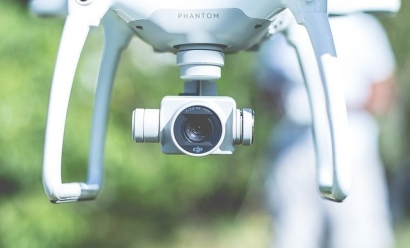
Many companies are integrating autonomous systems into their production processes using renewable energy. Individuals are using solar-powered drones to engage in remote work, improving employee and environmental safety measures. The technology also supports employment during pandemics by creating a contact-less medium.
The green revolution influenced solar drones’ development. Researchers at the National University of Singapore identified the ecological and transportation benefits of solar drones. The researchers placed photovoltaic (PV) panels on top of the unmanned aerial vehicles (UAV), creating uninterrupted power when the sun was shining.
PV panels help different industries and regions power drones for reliable usage. They also eliminate the emissions related to transportation and shipping, which help prevent climate change. There are 10 ways society can use solar drones to improve safety and efficiency.
The military and CIA were some of the first organizations to implement UAVs. They utilize the technology to track and target suspected terrorists to improve national safety. Solar drones can minimize power limitations and support 24-hour surveillance.
Medical response professionals may also benefit from solar-powered drone technology. Emergency professionals can utilize UAVs to quickly access medications, blood, defibrillators and other vital resources on site. Efficient medical product deliveries may increase a patient's chances of survival.
Emergency response professionals in China used drones during the pandemic to limit exposure. Drones traveled from door to door, taking individuals’ temperatures and recording the results. Individuals may also use solar-powered drones while responding to natural disasters.
Autonomous technologies can track and monitor ecological effects in unsafe regions without placing workers at risk. Solar power can fuel drones for enough time to assess ecological damage and help individuals retreat to safer regions. Some disaster relief professionals are using drones to detect hazard levels after major events like tsunamis and inform residents of active risks.
Agricultural professionals may also benefit from the technological advancements by engaging in smart farming. The new agriculture technique optimizes complex crop development to enhance yields and decrease adverse ecological impacts. Solar drones can monitor fields and obtain vital growth data to minimize waste.
Solar-powered drones can additionally support renewable energy advancements. Wind power professionals are using UAVs to conduct turbine inspections and maintenance. The technology improves workers’ safety, minimizing their fall risk.
The weather forecasting sector can also utilize the UAV technology to monitor environmental conditions around the clock. Professionals may use solar-powered drones to monitor temperature changes and predict major climate effects. Relying on autonomous technology for weather forecasting increases accuracy in the industry by limiting human error.
The mining industry may additionally use solar-powered drones to improve workers’ safety. A team of engineers explored the potential danger of battery-powered UAVs in mines. Individuals can replace conventional drones with solar versions to minimize adverse effects.
Insurance professionals can improve their health and safety by using solar-powered drones for inspections. After a major storm, individuals may prevent injuries by conducting roof inspections with UAVs. The technology also delivers more accurate data without the risk of human error.
As the demand for sustainable smart cities increases, urban developers search for efficient construction and planning techniques. Professionals can use solar UAVs to quickly survey urban spaces and access essential data. Developers can create low-impact cities using precise images from drones.
The final way solar-powered drones can benefit our world is by enhancing environmental conservation. Ecologists may use the technology to track endangered species around the clock and identify major extinction causes. UAVs also help professionals conduct environmental research without disrupting natural habitats.
One of the key advantages of solar-powered drones is reducing emissions. The transportation sector has the most significant impacts on climate change. Using solar-powered UAVs to deliver medical supplies and conduct research minimizes human transportation processes by promoting remote work.

